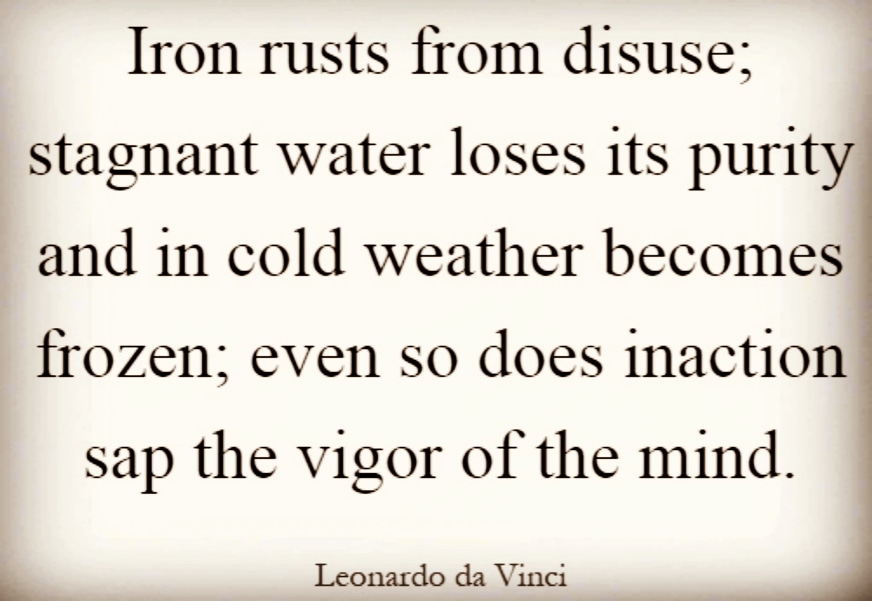
At a certain stage in my reading, I naturally met with the principal works of Machiavelli. They made a deep and lasting impression upon me, and shook my earlier faith. I derived from them not the most obvious teachings – on how to acquire and retain political power, or by what force or guile rulers must act if they are to regenerate their societies, or protect themselves and their States from enemies within or without, or what the principal qualities of rulers on the one hand, and of citizens on the other, must be, if their States are to flourish – but something else. Machiavelli was not a historicist: he thought it possible to restore something like the Roman Republic or Rome of the early Principate. He believed that to do this one needed a ruling class of brave, resourceful, intelligent, gifted men who knew how to seize opportunities and use them, and citizens who were adequately protected, patriotic, proud of their State, epitomes of manly, pagan virtues. That is how Rome rose to power and conquered the world, and it is the absence of this kind of wisdom and vitality and courage in adversity, of the qualities of both lions and foxes, that in the end brought it down. Decadent States were conquered by vigorous invaders who retained these virtues.
But Machiavelli also sets side by side with this the notion of Christian virtues – humility, acceptance of suffering, unworldliness, the hope of salvation in an afterlife – and he remarks that if, as he plainly himself favours, a State of a Roman type is to be established, these qualities will not promote it: those who live by the precepts of Christian morality are bound to be trampled on by the ruthless pursuit of power on the part of men who alone can re-create and dominate the republic which he wants to see. He does not condemn Christian virtues. He merely points out that the two moralities are incompatible, and he does not recognise an overarching criterion whereby we are enabled to decide the right life for men. The combination of virtù and Christian values is for him an impossibility. He simply leaves you to choose – he knows which he himself prefers.
The idea that this planted in my mind was the realisation, which came as something of a shock, that not all the supreme values pursued by mankind now and in the past were necessarily compatible with one another. It undermined my earlier assumption, based on the philosophia perennis, that there could be no conflict between true ends, true answers to the central problems of life.
Then I came across Giambattista Vico’s Scienza nuova. Scarcely anyone in Oxford had then heard of Vico, but there was one philosopher, Robin Collingwood, who had translated Croce’s book on Vico, and he urged me to read it. This opened my eyes to something new. Vico seemed to be concerned with the succession of human cultures – every society had, for him, its own vision of reality, of the world in which it lived, and of itself and of its relations to its own past, to nature, to what it strove for. This vision of a society is conveyed by everything that its members do and think and feel – expressed and embodied in the kinds of words, the forms of language that they use, the images, the metaphors, the forms of worship, the institutions that they generate, which embody and convey their image of reality and of their place in it; by which they live. These visions differ with each successive social whole – each has its own gifts, values, modes of creation, incommensurable with one another: each must be understood in its own terms – understood, not necessarily evaluated.
The Homeric Greeks, the master class, Vico tells us, were cruel, barbarous, mean, oppressive to the weak; but they created the Iliad and the Odyssey, something we cannot do in our more enlightened day. Their great creative masterpieces belong to them, and once the vision of the world changes, the possibility of that type of creation disappears also. We, for our part, have our sciences, our thinkers, our poets, but there is no ladder of ascent from the ancients to the moderns. If this is so, it must be absurd to say that Racine is a better poet than Sophocles, that Bach is a rudimentary Beethoven, that, let us say, the Impressionist painters are the peak which the painters of Florence aspired to but did not reach. The values of these cultures are different, and they are not necessarily compatible with one another. Voltaire, who thought that the values and ideals of the enlightened exceptions in a sea of darkness – of classical Athens, of Florence of the Renaissance, of France in the grand siècle and of his own time – were almost identical, was mistaken. Machiavelli’s Rome did not, in fact, exist. For Vico there is a plurality of civilisations (repetitive cycles of them, but that is unimportant), each with its own unique pattern. Machiavelli conveyed the idea of two incompatible outlooks; and here were societies the cultures of which were shaped by values, not means to ends but ultimate ends, ends in themselves, which differed, not in all respects – for they were all human – but in some profound, irreconcilable ways, not combinable in any final synthesis.
After this I naturally turned to the German eighteenth-century thinker Johann Gottfried Herder. Vico thought of a succession of civilisations, Herder went further and compared national cultures in many lands and periods, and held that every society had what he called its own centre of gravity, which differed from that of others. If, as he wished, we are to understand Scandinavian sagas or the poetry of the Bible, we must not apply to them the aesthetic criteria of the critics of eighteenth-century Paris. The ways in which men live, think, feel, speak to one another, the clothes they wear, the songs they sing, the gods they worship, the food they eat, the assumptions, customs, habits which are intrinsic to them – it is these that create communities, each of which has its own ‘lifestyle’. Communities may resemble each other in many respects, but the Greeks differ from Lutheran Germans, the Chinese differ from both; what they strive after and what they fear or worship are scarcely ever similar.
This view has been called cultural or moral relativism – this is what that great scholar, my friend Arnaldo Momigliano, whom I greatly admired, supposed both about Vico and about Herder. He was mistaken. It is not relativism. Members of one culture can, by the force of imaginative insight, understand (what Vico called entrare) the values, the ideals, the forms of life of another culture or society, even those remote in time or space. They may find these values unacceptable, but if they open their minds sufficiently they can grasp how one might be a full human being, with whom one could communicate, and at the same time live in the light of values widely different from one’s own, but which nevertheless one can see to be values, ends of life, by the realisation of which men could be fulfilled.
‘I prefer coffee, you prefer champagne. We have different tastes. There is no more to be said.’ That is relativism. But Herder’s view, and Vico’s, is not that: it is what I should describe as pluralism – that is, the conception that there are many different ends that men may seek and still be fully rational, fully men, capable of understanding each other and sympathising with and deriving light from each other, as we derive it from reading Plato or the novels of medieval Japan – worlds, outlooks, very remote from our own. Of course, if we did not have any values in common with these distant figures, each civilisation would be enclosed in its own impenetrable bubble, and we could not understand them at all; this is what Spengler’s typology amounts to. Intercommunication between cultures in time and space is possible only because what makes men human is common to them, and acts as a bridge between them. But our values are ours, and theirs are theirs. We are free to criticise the values of other cultures, to condemn them, but we cannot pretend not to understand them at all, or to regard them simply as subjective, the products of creatures in different circumstances with different tastes from our own, which do not speak to us at all.
There is a world of objective values. By this I mean those ends that men pursue for their own sakes, to which other things are means. I am not blind to what the Greeks valued – their values may not be mine, but I can grasp what it would be like to live by their light, I can admire and respect them, and even imagine myself as pursuing them, although I do not – and do not wish to, and perhaps could not if I wished. Forms of life differ. Ends, moral principles, are many. But not infinitely many: they must be within the human horizon. If they are not, then they are outside the human sphere. If I find men who worship trees, not because they are symbols of fertility or because they are divine, with a mysterious life and powers of their own, or because this grove is sacred to Athena – but only because they are made of wood; and if when I ask them why they worship wood they say ‘Because it is wood’ and give no other answer; then I do not know what they mean. If they are human, they are not beings with whom I can communicate – there is a real barrier. They are not human for me. I cannot even call their values subjective if I cannot conceive what it would be like to pursue such a life.
What is clear is that values can clash – that is why civilisations are incompatible. They can be incompatible between cultures, or groups in the same culture, or between you and me. You believe in always telling the truth, no matter what: I do not, because I believe that it can sometimes be too painful and too destructive. We can discuss each other’s point of view, we can try to reach common ground, but in the end what you pursue may not be reconcilable with the ends to which I find that I have dedicated my life. Values may easily clash within the breast of a single individual; and it does not follow that, if they do, some must be true and others false. Justice, rigorous justice, is for some people an absolute value, but it is not compatible with what may be no less ultimate values for them – mercy, compassion – as arises in concrete cases.
Both liberty and equality are among the primary goals pursued by human beings through many centuries; but total liberty for wolves is death to the lambs, total liberty of the powerful, the gifted, is not compatible with the rights to a decent existence of the weak and the less gifted. An artist, in order to create a masterpiece, may lead a life which plunges his family into misery and squalor to which he is indifferent. We may condemn him and declare that the masterpiece should be sacrificed to human needs, or we may take his side – but both attitudes embody values which for some men or women are ultimate, and which are intelligible to us all if we have any sympathy or imagination or understanding of human beings. Equality may demand the restraint of the liberty of those who wish to dominate; liberty – without some modicum of which there is no choice and therefore no possibility of remaining human as we understand the word – may have to be curtailed in order to make room for social welfare, to feed the hungry, to clothe the naked, to shelter the homeless, to leave room for the liberty of others, to allow justice or fairness to be exercised.
Antigone is faced with a dilemma to which Sophocles implied one solution, Sartre offers the opposite, while Hegel proposes ‘sublimation’ on to some higher level – poor comfort to those who are agonised by dilemmas of this kind. Spontaneity, a marvellous human quality, is not compatible with capacity for organised planning, for the nice calculation of what and how much and where – on which the welfare of society may largely depend. We are all aware of the agonising alternatives in the recent past. Should a man resist a monstrous tyranny at all costs, at the expense of the lives of his parents or his children? Should children be tortured to extract information about dangerous traitors or criminals?
These collisions of values are of the essence of what they are and what we are. If we are told that these contradictions will be solved in some perfect world in which all good things can be harmonised in principle, then we must answer, to those who say this, that the meanings they attach to the names which for us denote the conflicting values are not ours. We must say that the world in which what we see as incompatible values are not in conflict is a world altogether beyond our ken; that principles which are harmonised in this other world are not the principles with which, in our daily lives, we are acquainted; if they are transformed, it is into conceptions not known to us on earth. But it is on earth that we live, and it is here that we must believe and act.
The notion of the perfect whole, the ultimate solution, in which all good things coexist, seems to me to be not merely unattainable – that is a truism – but conceptually incoherent; I do not know what is meant by a harmony of this kind. Some among the Great Goods cannot live together. That is a conceptual truth. We are doomed to choose, and every choice may entail an irreparable loss. Happy are those who live under a discipline which they accept without question, who freely obey the orders of leaders, spiritual or temporal, whose word is fully accepted as unbreakable law; or those who have, by their own methods, arrived at clear and unshakeable convictions about what to do and what to be that brook no possible doubt. I can only say that those who rest on such comfortable beds of dogma are victims of forms of self-induced myopia, blinkers that may make for contentment, but not for understanding of what it is to be human.
The full essay is here.






